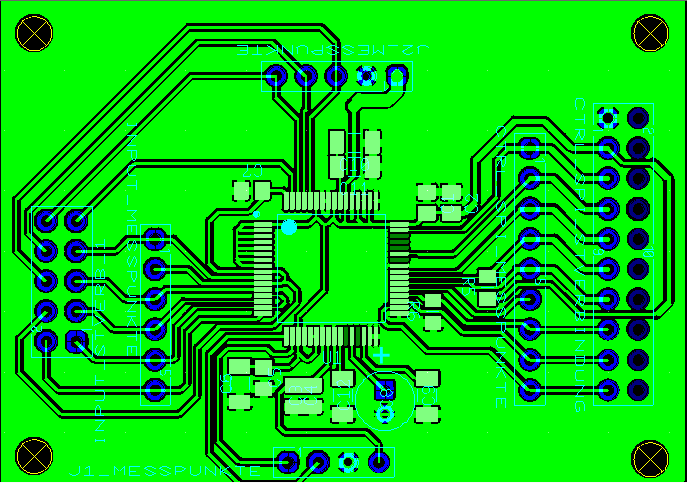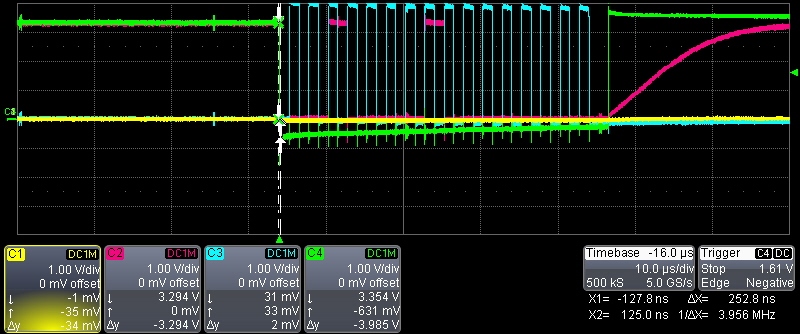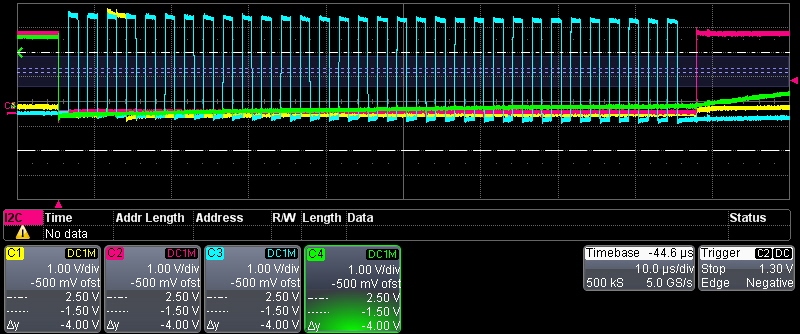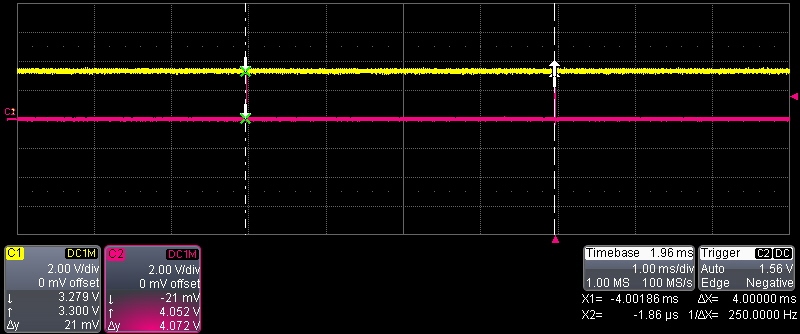Hi I use the ADS1294 together with the Stellaris LM3S8962 Evaluation Kit.
After following the initialization process I don´t get a DRDY signal.
To test the communication I tried to read the ID register unfortunately this is although not possible.
Here is my code and the Layout:
/*
* EKG_V1.c
*
* Created on: 15.04.2015
* Author: Alexander
*/
#include "EKG.h"
// INIT ----------------------------------------------------------------------------------------
void InitHW(void)
{
SysCtlClockSet(SYSCTL_SYSDIV_1 | SYSCTL_USE_OSC | SYSCTL_OSC_MAIN |
SYSCTL_XTAL_8MHZ);
SysCtlPeripheralEnable(SYSCTL_PERIPH_GPIOA);
GPIOPinTypeGPIOOutput(GPIO_PORTA_BASE,GPIO_PIN_7| GPIO_PIN_3 /*CS*/|GPIO_PIN_5/*SSITX*/);
SysCtlPeripheralEnable(SYSCTL_PERIPH_GPIOC);
GPIOPinTypeGPIOOutput(GPIO_PORTC_BASE,GPIO_PIN_7);
SysCtlPeripheralEnable(SYSCTL_PERIPH_GPIOD);
GPIOPinTypeGPIOOutput(GPIO_PORTD_BASE,GPIO_PIN_5);
SysCtlPeripheralEnable(SYSCTL_PERIPH_GPIOF);
GPIOPinTypeGPIOOutput(GPIO_PORTF_BASE,GPIO_PIN_0);
// Ausgänge ausschalten
// START = 0
GPIOPinWrite(GPIO_PORTA_BASE, GPIO_PIN_7, 0x00);
// Reset = 0
GPIOPinWrite(GPIO_PORTC_BASE, GPIO_PIN_7, 0x00);
SysCtlDelay(100);
// PWDN = 0
GPIOPinWrite(GPIO_PORTD_BASE, GPIO_PIN_5, 0x00);
// CS = 0
GPIOPinWrite(GPIO_PORTA_BASE, GPIO_PIN_3, 0x00);
// SSITX = 0
GPIOPinWrite(GPIO_PORTA_BASE, GPIO_PIN_5, 0x00);
SysCtlPeripheralEnable(SYSCTL_PERIPH_GPIOG);
GPIOPinTypeGPIOInput(GPIO_PORTG_BASE,GPIO_PIN_0);
GPIOPadConfigSet(GPIO_PORTG_BASE, GPIO_PIN_0, GPIO_STRENGTH_2MA, GPIO_PIN_TYPE_STD_WPU);
}
void InitSSI(void)
{
//
// Enable the GPIO module that contains the GPIO pins to be used by
// the SSI, as well as the SSI module.
//
SysCtlPeripheralEnable(SYSCTL_PERIPH_SSI0);
SysCtlPeripheralEnable(SYSCTL_PERIPH_GPIOA);
//
// Configure the GPIO pins for use by the SSI module.
//
GPIOPinTypeSSI(GPIO_PORTA_BASE, (GPIO_PIN_2 | GPIO_PIN_3 |
GPIO_PIN_4 | GPIO_PIN_5));
//GPIOPadConfigSet(GPIO_PORTA_BASE, GPIO_PIN_2 | GPIO_PIN_3| GPIO_PIN_4 | GPIO_PIN_5, GPIO_STRENGTH_8MA, GPIO_PIN_TYPE_STD_WPU);
//
SSIDisable(SSI0_BASE);
// Initalize the hardware SSI module, using mode 1 and 8 data bits.
//
sysClk=SysCtlClockGet();
SSIConfigSetExpClk(SSI0_BASE, sysClk, SSI_FRF_MOTO_MODE_1, //siehe S. 15
SSI_MODE_MASTER, 400000, 8); // 10000 gleich 10KHz
//
// Enable the hardware SSI.
//
SSIEnable(SSI0_BASE);
}
void InitADS(void)
{
// Power-up sequencing
SysCtlDelay(1000);
// Start = 1
GPIOPinWrite(GPIO_PORTA_BASE, GPIO_PIN_7, GPIO_PIN_7);
// PWDN =1
GPIOPinWrite(GPIO_PORTD_BASE, GPIO_PIN_5, GPIO_PIN_5);
// RESET =1
GPIOPinWrite(GPIO_PORTC_BASE, GPIO_PIN_7, GPIO_PIN_7);
// Wait for 0,275s
SysCtlDelay(750000); // bei 1 gleich 0,375 µS
////////////////////////////////////////////////////////////////////////////////////
// Test
// Sende STANDBY
//command_write(0x04);
// Sende WAKEUP
//command_write(0x02);
//////////////////////////////////////////////////////////////////////////////////////////////7
// Sende SDATAC
command_write(0x11);
// Setze Config3 0xC0h
reg_write(0x03, 0xC0);
// Setze Config1 0x86h
reg_write(0x01, 0x86);
// Setze Config2 0x00h
reg_write(0x02, 0x00);
// Set ADS1294 CH to 0x01h
reg_write(0x05, 0x01);
reg_write(0x06, 0x01);
reg_write(0x07, 0x01);
reg_write(0x08, 0x01);
// Start =1
GPIOPinWrite(GPIO_PORTA_BASE, GPIO_PIN_7, GPIO_PIN_7);
//sendSSI(0x08);
//sende RDATAC
command_write(0x10);
//Sende SDATAC
command_write(0x11);
// Config2 auf 0x10h setzen
reg_write(0x02, 0x10);
// CH1SET auf 0x05h setzen
reg_write(0x05, 0x05);
// Sende RDATAC
command_write(0x10);
//command_write(0x11);
}
// MAIN ---------------------------------------------------------------------------------------
int main(void)
{
//long receiveLength;
InitHW();
// Power-up sequencing
SysCtlDelay(1000);
SysCtlDelay(100);
GPIOPinWrite(GPIO_PORTF_BASE, GPIO_PIN_0, 1);
InitSSI();
SysCtlDelay(5000000);
GPIOPinWrite(GPIO_PORTF_BASE, GPIO_PIN_0, 0);
SysCtlDelay(5000000);
GPIOPinWrite(GPIO_PORTF_BASE, GPIO_PIN_0, 1);
InitADS();
SysCtlDelay(5000000);
GPIOPinWrite(GPIO_PORTF_BASE, GPIO_PIN_0, 0);
while(1)
{ // TODO: Hauptprogramm
// Sende WAKEUP
command_write(0x02);
SysCtlDelay(10);
command_write(0x11);
SysCtlDelay(10);
command_write(0x12);
SysCtlDelay(1000);
// Sende STANDBY
command_write(0x04);
SysCtlDelay(10);
reg_write(0x01, 0x86);
test=reg_read(0x01);
SysCtlDelay(10);
command_write(0x12);
SysCtlDelay(5000000);
GPIOPinWrite(GPIO_PORTF_BASE, GPIO_PIN_0, 1);
SysCtlDelay(5000000);
GPIOPinWrite(GPIO_PORTF_BASE, GPIO_PIN_0, 0);
}
}
// METHODES -----------------------------------------------------------------------------------
void sendSSI(unsigned long data)
{
// CS Low
//GPIOPinWrite(GPIO_PORTA_BASE, GPIO_PIN_3, 0x00);
SSIDataPut(SSI0_BASE, data);
// CS High
//GPIOPinWrite(GPIO_PORTA_BASE, GPIO_PIN_3, GPIO_PIN_3);
}
int receiveSSI(unsigned long* data)
{
int index=0;
long receive=1;
// CS Low
// GPIOPinWrite(GPIO_PORTA_BASE, GPIO_PIN_3, 0x00);
while (receive==1)
{
receive=SSIDataGetNonBlocking(SSI0_BASE, &data[index]);
if (receive!=0)
{
index++;
}
}
// CS High (optional)
// GPIOPinWrite(GPIO_PORTA_BASE, GPIO_PIN_3, GPIO_PIN_3);
return index;
}
void reg_write(unsigned long addr, unsigned long data)
{
// CS Low (optional)
//GPIOPinWrite(GPIO_PORTA_BASE, GPIO_PIN_3, 0x00);
sendSSI(0x40|addr);
sendSSI(0x00);
sendSSI(data);
SysCtlDelay(10);
// CS High (optional)
//GPIOPinWrite(GPIO_PORTA_BASE, GPIO_PIN_3, GPIO_PIN_3);
}
unsigned long reg_read(unsigned long addr)
{ int index=0;
// CS Low (optional)
// GPIOPinWrite(GPIO_PORTA_BASE, GPIO_PIN_3, 0x00);
sendSSI(0x20|addr);
sendSSI(0x00); // 1 Byte
while(index==0)
{
index=receiveSSI(&receiveData[0]);
}
SysCtlDelay(10);
// CS High
//GPIOPinWrite(GPIO_PORTA_BASE, GPIO_PIN_3, GPIO_PIN_3);
return receiveData[0];
}
void command_write(unsigned long data)
{
sendSSI(data);
SysCtlDelay(10);
}
Layout:

I can also provide some Scope pictures:
green: CS, red: DIN, blue: SCLK, yellow: DOUT
I would be very thankfull for any help
regards Alexander




